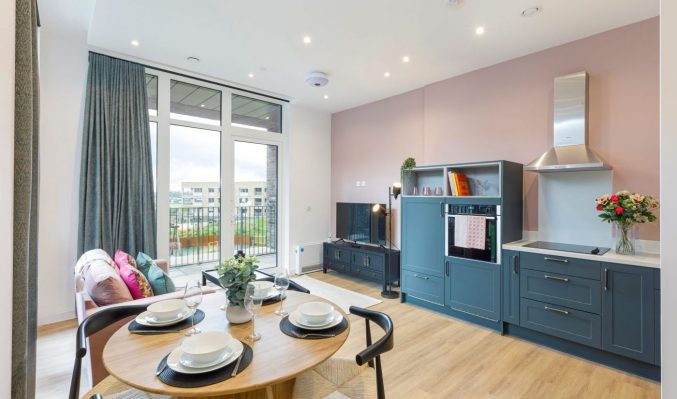Lockdown, what lockdown?
By Laura Miller

Less furlough, more lending. That’s the message coming from brokers and bridging lenders three weeks into the third national lockdown, which started on 5 January and is expected to continue until 2 April.
In stark contrast to a year ago, Chancellor Rishi Sunak has pledged to keep construction and the housing market open in the latest lockdown, and according to Signature Property Finance CEO Tony Gilbertson business is indeed booming.
“We’ve just posted our record year, lending £37m, a significant increase over previous years and the start to 2021 so far looks like more of the same,” he says. SPF is seeing fewer enquiries but, Gilbertson says, more of quality, which suits him.
“That’s the work we can support best. Small scale ground up development work, up to 15 units. The trend for city-dwellers to leave for rural locations is driving a boom in these developments across the country, which can only be good for us this year and beyond,” he says.
Lockdown 3.0 coincides with an immensely busy period in property buying. The temporary stamp duty land tax holiday on properties under £500,000 from July is due to end on 31 March. Buyers rushing to take advantage sent property transactions soaring in December, a typically quiet month, by 31.5% compared to the same time in 2019, latest statistics from HMRC have revealed.
SPF saw a boom in property sales for buy-to-let in 2020 and as the stamp duty deadline draws near, “getting the purchase, legals and financing done in two months, given the current demand and pressure on businesses like ours, will be tough”, says Gilbertson. He expects some disappointment which “will need to be managed carefully”.
Amid the flood of buying activity in December online property listings site Rightmove reported two in every seven attempts to buy is ending in the sale collapsing, up from less than a fifth last summer. But strains on the chains are presenting opportunities for bridging to step in and rescue deals. Lender Hope Capital has also been seeing ferocious demand.
“We saw exceptional performance in H2 2020, so [we] may have in fact helped sales to progress where in a mainstream market they would have collapsed,” says Jonathan Sealey, Hope’s CEO. The lender launched three new products just two days into this latest lockdown. “There’s no holding us back,” Sealey says.
Heightened activity has seen some loosening of the criteria contraction brokers reported in previous lockdowns. Hope Capital is back at 75% LTV with rates starting at an “almost pre-Covid level” of 0.54%. SPF lends on open market values, rather than 180-day valuations which Gilberston points out typically tend to be 10-15% lower, “so although our LTV percentages have dropped slightly at present, the overall lending on day one is higher for most clients”.
From a business perspective this resurgence in demand for bridging and improved availability of lending is welcome news. While other parts of the British economy hunker down for years of stagnation and losses (aviation, for example, predicts no return to 2019 activity levels until 2023), property, for now at least, is in a frenzy. But there is a human toll to trying to fire on all cylinders during a national lockdown.
The government’s furlough allowance, or Job Retention Scheme, runs until the end of April but in a bid to ‘bounce back’ fewer firms are offering it this time, a particular problem for working parents while lockdown closes schools for months. Seven in 10 mums who asked for furlough to cope with childcare were turned down, trade union TUC found. Bridging, on the frontline of the current property boom, is trying to navigate the need for staff to work with them often having kids at home.
“In the first lockdown we looked at every individual situation before deciding who would be furloughed and took into full consideration the needs and requests of team members,” says Clare Jupp, managing director of broker Brightstar. “This time our full team is working as the business demand is there.” Requests for flexibility are considered. “We see no sense in letting a team member struggle with a work/home ‘balancing act’,” she adds.
Lockdown 3.0 has triggered a surge in calls to mental health helplines, with charities and psychiatrists urging the government to offer more support. (Even before Covid-19 mental health was the most common cause of long-term sickness absence in UK workplaces, according to the Chartered Institute of Personnel and Development). Employers, reminded of their duty of care to staff, are trying to fulfil it through a computer video screen.
“Coaching sessions continue with me, an opportunity for confidential discussions,” says Jupp. Incentives and competitions “keep motivation and good spirit in place”. Brightstar bosses have an ‘open door’ policy, send out newsletters praising employees’ contributions, and are still celebrating work anniversaries. This last point is particularly vital in confinement, says Jupp: “It gives a sense of a fluid, onward journey, that we’re not stuck in time.” Strategic meetings are also meant to keep staff looking beyond the present limbo to the year ahead.
“It’s very difficult to balance the needs of the business and offer flexibility, due to the demands of clients and the transactions we deal with,” admits Lucy Barrett, managing director at broker Vantage Finance. No-one, she reflects, chose this situation, and everyone is trying their best.
Vantage is running intercompany virtual challenges on Teams, fitness sessions, and mental wellbeing advice alongside more lighthearted activities. The broker is pushing its employee benefits, which has free mental health apps, services and techniques. “All managers are checking in with individuals regularly even if just for a quick chat to ensure we are helping each other through this,” says Barrett.
Managers are strained too. Service levels from lenders, solicitors and valuers are under more pressure than ever due to the stamp duty holiday, and Barrett says maintaining a realistic management of expectations is crucial. “The later in the process people are the less likely the reality of hitting this March deadline,” she warns, comparing the current rush to when the BTL stamp duty surcharge was introduced, “but with the added complication of being in national lockdown”. Brokers can, she says, “only do what we can control”, adding “honesty is key”.
With lockdown looking set to continue for the next 10 weeks everyone will need all the help they can get to push through a heady mix of work pressures, boredom, childcare, confinement, health fears and hope that sometime soon this will be over. SPF’s Gilbertson probably speaks for many, when replying (half in jest) his strategy to deal with the necessary national sentence will be “drink more”.
“Seriously though, we will carry on as before and be successful again,” he says, reflecting that in the stricter first lockdown last March “we stayed open and although we had to do more desktop valuations we got through it, supported our clients to get their deals done”.
“As we say at Signature”, he adds, “we will always find a way to lend, and not turn deals down”. By the looks of things, his sentiment describes the approach of pretty much everyone in bridging right now.

Laura Miller is a freelance journalist who writes about money and business. She regularly appears in UK national and trade newspapers and magazines, and has previously worked for ITV News and the Telegraph among others. Find her on twitter @thatlaurawrites










You must be logged in to post a comment.